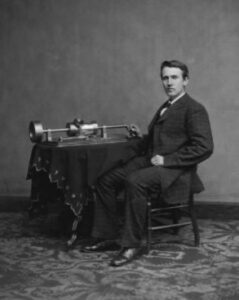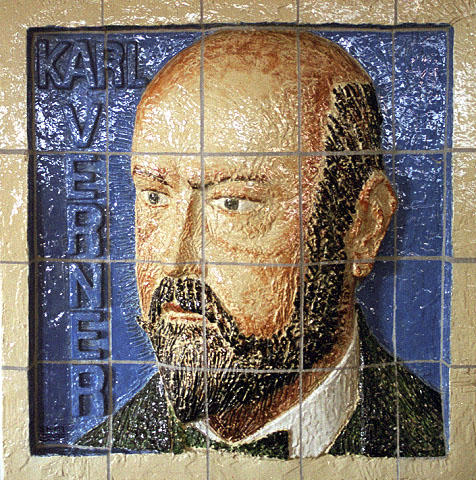Lingoblog is celebrating the summer with a biography about the world-famous linguist Karl Verner in four parts. In case you missed the first three parts, follow the links here, here and here. Look forward to many more interesting posts after the summer break.
Professor in Copenhagen
When Karl Verner’s teacher, Professor Smith, died in 1881, Verner decided despite great hestitation to apply for a position at Copenhagen University as an associate professor in Slavic studies. From April 1888 he was appointed extraordinary professor. The same year he was – reluctantly – made part of The Royal Danish Society of Sciences, even though he had despised fancy company throughout his life. He preferred the company of the common people instead. A truthful anecdote told by his fellow researcher and neighbor for many years, Claudius Wilkens (1844-1929), puts this into perspective: Sometimes Verner would be visited by great foreign scientists who wanted to greet the famous man. Even though he had no problem being helpful with advice and deeds, these signs of world fame terrified him. Wilkens recounts that Karl Verner was once outside his house painting in an old Icelandic skin sweater. A German professor passed by and asked if Herr professor Karl Verner was home. The painter responded in German that the ”Herr Professor” was unfortunately not home and cheerfully kept painting.
At the university, Karl Verner was also living a quiet life. He was very attentive with his teaching. In order to not “cheat the state”, as he would say, his lectures went from the first day of class to the last. Otto Jespersen attended as a student and recounts that Karl Verner was a thorough lecturer. Verner was very engaged with the conditions of sound history, and he tirelessly tried to teach and clarify this topic to the students. Verner wrote word lists to the students to illustrate the problems being treated. He readily lent them to the students, and as Jespersen emphasizes, he was such a modest person that it would not have mattered to Verner if they had kept them.
Otto Jespersen has another typical anecdote about Karl Verner. Usually, he had an audience of between one and four students since his lectures were about exotic topics such as Russian, Old Bulgarian and the like. One semester, he found to his surprise a big crowd of listeners in his auditorium. The reason for this was that the students wanted to listen to the lectures of Georg Brandes, which were held in the auditorium next door. They arrived at the university an hour beforehand and went to the next room to secure a seat at the stuffed auditorium of Georg Brandes. The many listeners did not please Karl Verner, so he moved his lecture to another auditorium.
Being able to get a grip on language – Verner and technology
Karl Verner was a modest and reserved person throughout his life. His daily studies were characterized by great diligence. Once he had found the solution to a problem, then his work had come to an end. To afterwards sit and write it all down so that others could read about the problem, was of no interest to him. The few things he has published were only made because of the persuasion from others. It is said about Karl Verner that he was full of self-critique and good ideas till the end. Maybe this was a bad combination. But nothing was wrong with Verner’s discoveries.
Karl Verner’s language in dissertations and letters is characterized by being logical and clear. One can still understand them without trouble, and they have validity today still.

Characteristic for Verner’s burning interest for language and the phonetic evolution, he had already in 1886 acquired an Edinsonian phonograph. This precurser to the tape recorder was an expensive tool at the time. When speaking into a funnel, the vibrations of the sound were etched into tinfoil. The meter-long recordings made it possible to compare sounds. In a letter to his brother Ludvig, Karl writes the 16th of June 1886: “The field of linguistics has not yet been able to be exact enough because when working with the fundamental elements, the sounds, one must rely too much on the subjective: One’s eardrum. One person perceives a sound like such and another differently, but no one knows if it is objective. My plan is to change the sounds of language so that one can hold them and feel them”. Verner wanted to let nature write down the oscillations. His goal was to investigate what the language sounds were made of. Today, research within the field of phonetics has progressed significantly, and the modern instruments are capable of recording sounds with great precision. Verner’s attempt using his “Ednisonograph” is but a minor step on the way to where we are now. In 1892, Verner held a lecture for the The Royal Danish Academy of Sciences and Letters about his recordings with the phonograph with the title: An attempt in recording the oscillations of the sound of language. This did not hold back on encouraging others to write about the experiments with the machine, but unfortunately, he took this knowledge to the grave. After a stroke, Karl Verner died the 5th of November 1896.
Postscript and moral
Of course, this article has a moral. When contributing to a school’s festschrift it is somewhat required. The contribution has two purposes: First of all, I wanted to tell you about a famous former student of Aarhus Cathedral School. Perhaps Karl Verner is shadowed by many other great former students. With the many ‘Ole’s in mind, Karl’s deed is is hardly less than the feat of measuring the hesitation of light.
The second purpose of the contribution was telling something about the interesting occupation with language and language evolution. Linguistics has, like his brother the science of literature, just the purpose of finding out more about ourselves. One might say: For the joy. But knowledge about the history of our language can give us insight into European history. This is a topic that does not need to be in the shadow of other sciences.
Frontpage picture: The sculptor Knud Nellemose’s stoneware relief. On display at the Verner-room at the Germanic Institute, Aarhus University 1951.
The article “Karl Verner – A world-famous student” has previously been published in the book Aarhus Cathedral School, 1195-1995, edited by Finn Stein Larsen. Aarhus: Aarhus Cathedral School, 1995.
Lars H. Eriksen. Born in 1957, graduate with A-levels in modern languages from Aarhus Cathedral School in 1976, studies in Nordic, linguistics, Germanische Philologie as well as studies in law, tax law and economy at the University of Aarhus, Universität Düsseldorf, Universität Bayreuth and University of Southern Denmark.
Cand. phil. in Danish 1982, Ph.D 2001 based on a dissertation about “Language in front of the court in Denmark and Germany” (Sprache vor Gerich und in der Verwantung”) – Danish lecturer in Bayreuth 1980-1990, diploma of law from Bayern 1990, then Rechtsreferendar in Bayreuth, member of staff at legal offices in Düsseldorf, Sachsen and Bayern. 1996-2001 assistant professor in Danish and German at the border-crossing studies in Sønderborg and Flensburg. Member of staff on international language projects about language politics and legal language, tax law, EU concern tax law, and criminal law. Employed by the EU commission for international social security. Now works as a tax consultant in international relations in Southern Slesvig. Has written articles on German and Danish language conditions, language teaching, and legal topics. Publisher of several Danish-German dictionaries within the field of law and tax/annual accounts 2016-2021, latest:
– Juridisk ordbog tysk dansk, 380 sider. Ny udgave 2021
– Juridisk ordbog dansk tysk, 380 sider. Ny udgave 2021
– Ny regnskabsordbog dansk – tysk 305 sider. Ny udgave 2021
With exemplary translation of Danish annual accounts
– Ny regnskabsordbog tysk – dansk 256 sider
With exemplary translation of German annual accounts. New edition 2001.





